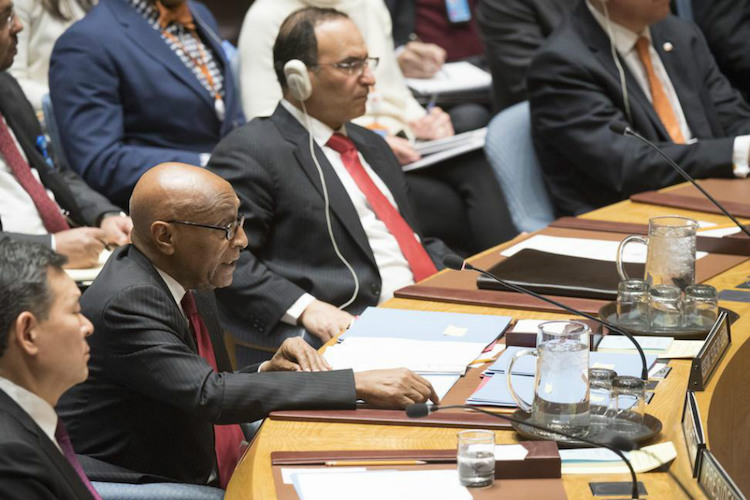By Tayé-Brook Zerihoun
Tayé-Brook Zerihoun is the Assistant Secretary-General for United Nations Department of Political Affairs. The following are extensive excerpts from his ‘briefing’ to the Security Council on ‘The Situation in the Middle East’ on 5 January 2018.
UNITED NATIONS (IDN) – The protests in the Islamic Republic of Iran started on 28 December 2017 when hundreds of Iranians gathered, in a largely peaceful manner, in Mashhad, the country’s second-largest city, chanting slogans against economic hardship.
Over the following several days, protests occurred in other urban areas, including Tehran, as well as many rural areas. Some of the slogans also expressed disappointment at slow or limited change in social strictures and political freedoms, and criticized what demonstrators decried as the privileged position of the clergy and elements of the country’s security establishment. In some cases, demonstrators demanded that Iran cease costly involvement in the region.
As the protests escalated, some turned violent. Videos posted on social media platforms, several of which remain largely blocked by the Government, and footage broadcast by state TV channels showed the beating of protesters, as well as the burning of government offices, banks and religious centres.
According to reports carried by official Iranian media, more than 20 Iranians, including a teenage boy and a policeman, have died during the protests. Iran’s Ministry of the Interior stated that over 1,000 protesters have been detained, although many may have since been released.
With very limited presence on the ground, the Secretariat cannot confirm or deny the authenticity of these images that have been broadcast nor the extent of violence. However, we have received reports that the police, rather than military forces, were responding to the protests.
On 3 January Iran’s Revolutionary Guards announced the end of the anti-government protests. Recent reports indicate smaller and scattered demonstrations. Meanwhile, from 3 to 5 January, large pro-government rallies were reportedly held across the country, with participants expressing support for the Supreme Leader and condemning violence.
On 31 December 2017, President Rouhani told a Cabinet meeting that the Iranian people should be allowed “space” to protest and criticize the government. At the same time, he stressed that violence would not be tolerated.
Two days later, on 2 January, Supreme Leader Ayatollah Khamenei accused Iran’s enemies, without naming them, of “stirring” the unrest.
On 3 January, the Permanent Representative of Iran to the United Nations wrote to the Secretary-General, accusing the United States of stepping up “its acts of intervention in a grotesque way in Iran’s internal affairs under the pretext of providing support for sporadic protests” in Iran.
The outbreak of violent protests in Iran has focused attention to events in the country. A number of world leaders have expressed support for the Iranian protesters. Others, including the European Union, have called on the Iranian authorities to respect the right to peaceful demonstration and freedom of opinion. Yet more have supported the Government of Iran calling the protests an internal matter.
On 3 January, the Secretary-General issued a statement deploring the loss of life in the protests, and urging respect for the rights to peaceful assembly and freedom of expression and that demonstrations take place in a peaceful manner. The same day, the United Nations High Commissioner for Human Rights called on the Iranian authorities “to handle the wave of protests that have taken place around the country with great care so as not to further inflame violence and unrest,” and to investigate all deaths and serious injuries that have occurred so far.
On 5 January, four United Nations Special Rapporteurs stated that “[t]he Iranian authorities should take immediate action to ensure that all citizens can exercise peacefully the right to freedom of expression and assembly, and should ensure that these and other fundamental rights are not met with violence.”
As of today, the United Nations’ development work in the Islamic Republic of Iran has not been significantly affected by the recent events.
The Secretariat will continue to monitor developments on the ground and engage Iranian authorities with a view to contributing to efforts that address, as the Secretary-General underscored in his statement of 3 January, the legitimate concerns of the population through peaceful means and avoid violence or retribution against peaceful protestors. [IDN-InDepthNews – 08 January 2018]
Photo: Tayé-Brook Zerihoun, Assistant Secretary-General for Political Affairs, briefing the Security Council on the situation in the Middle East on 5 January 2018. UN Photo/Eskinder Debebe
IDN is the flagship of International Press Syndicate.
facebook.com/IDN.GoingDeeper – twitter.com/InDepthNews

